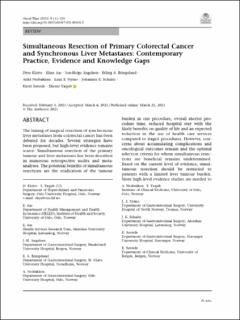| dc.contributor.author | Kleive, Dyre | |
| dc.contributor.author | Aas, Eline | |
| dc.contributor.author | Angelsen, Jon-Helge | |
| dc.contributor.author | Bringeland, Erling Audun | |
| dc.contributor.author | Nesbakken, Arild | |
| dc.contributor.author | Nymo, Linn Såve | |
| dc.contributor.author | Schultz, Johannes Kurt | |
| dc.contributor.author | Søreide, Kjetil | |
| dc.contributor.author | Yaqub, Sheraz | |
| dc.date.accessioned | 2021-11-26T13:24:36Z | |
| dc.date.available | 2021-11-26T13:24:36Z | |
| dc.date.created | 2021-11-19T11:18:35Z | |
| dc.date.issued | 2021 | |
| dc.identifier.issn | 2366-1070 | |
| dc.identifier.uri | https://hdl.handle.net/11250/2831707 | |
| dc.description.abstract | The timing of surgical resection of synchronous liver metastases from colorectal cancer has been debated for decades. Several strategies have been proposed, but high-level evidence remains scarce. Simultaneous resection of the primary tumour and liver metastases has been described in numerous retrospective audits and meta-analyses. The potential benefits of simultaneous resections are the eradication of the tumour burden in one procedure, overall shorter procedure time, reduced hospital stay with the likely benefits on quality of life and an expected reduction in the use of health care services compared to staged procedures. However, concerns about accumulating complications and oncological outcomes remain and the optimal selection criteria for whom simultaneous resections are beneficial remains undetermined. Based on the current level of evidence, simultaneous resection should be restricted to patients with a limited liver tumour burden. More high-level evidence studies are needed to evaluate the quality of life, complication burden, oncological outcomes, as well as overall health care implications for simultaneous resections. | en_US |
| dc.language.iso | eng | en_US |
| dc.publisher | Springer | en_US |
| dc.rights | Navngivelse-Ikkekommersiell 4.0 Internasjonal | * |
| dc.rights.uri | http://creativecommons.org/licenses/by-nc/4.0/deed.no | * |
| dc.title | Simultaneous Resection of Primary Colorectal Cancer and Synchronous Liver Metastases: Contemporary Practice, Evidence and Knowledge Gaps | en_US |
| dc.type | Journal article | en_US |
| dc.type | Peer reviewed | en_US |
| dc.description.version | publishedVersion | en_US |
| dc.rights.holder | Copyright 2021 the authors | en_US |
| dc.source.articlenumber | 111–120 | en_US |
| cristin.ispublished | true | |
| cristin.fulltext | original | |
| cristin.qualitycode | 1 | |
| dc.identifier.doi | 10.1007/s40487-021-00148-2 | |
| dc.identifier.cristin | 1956365 | |
| dc.source.journal | Oncology and Therapy | en_US |
| dc.identifier.citation | Oncology and Therapy. 2021, 9, 111–120. | en_US |
| dc.source.volume | 9 | en_US |

